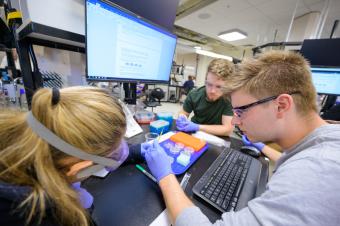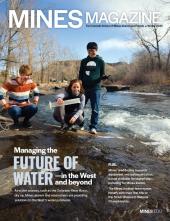Quantitative Biosciences and Engineering helps students make sense of biological systems
Mines is training next generation of biological engineers skilled in both bioscience and computer science via the new Bachelor of Science degree program


By Sarah Kuta, Special to Mines Magazine
Because of scientific and technological advancements over the last decade or so, such as genomic editing and DNA sequencing and synthesis, researchers believe they are now on the cusp of solving some of the world’s most pressing medical and environmental problems.
Doctors may one day offer personalized medicine based on patients’ genetics and possibly even modify their genes to prevent diseases or halt the progression of cancer, for instance. Researchers are also pursuing enzymes that can degrade plastic waste, and entrepreneurs are developing sustainable products like lab-grown meats and clothing made of mushrooms.
But to achieve these and other bioscience-related feats that have the potential to improve the health of humans and the planet, industry and academia need curious, outside-the-box thinkers who can untangle massive of amounts of data and have a deep understanding of biology, chemistry and physics.
Mines is meeting these needs by training the next generation of biological engineers who are skilled in both bioscience and computer science via its new undergraduate Quantitative Biosciences and Engineering (QBE) degree. Quantitative biology is characterized by its use of mathematical and computational methods to analyze and model biological systems. It is a rapidly growing field that is transforming our understanding of complex biological processes from the molecular level to the level of entire ecosystems. The program, which began enrolling students in Fall 2021, also helps meet student demand for careers in medicine, pharmaceuticals and emerging biotechnology fields.
“Students graduating with a QBE degree will have a strong biological understanding, coupled with a strong computational toolkit to tackle complex biological systems,” said Teaching Associate Professor Josh Ramey, who directs the new program. “The data being generated from biological systems is growing exponentially, and being able to manage and model that data is an essential skill set for the next generation of biologists. QBE graduates will be distinct from other biology majors in their preparation with regards to their quantitative skill sets of computer programming and computational modeling.”
Faculty from multiple departments, including Chemical and Biological Engineering, Civil and Environmental Engineering, Mechanical Engineering, Applied Mathematics and Statistics, Metallurgical and Materials Engineering, Chemistry and Physics are all teaching classes within the interdisciplinary program.
By the end of the 2022-23 school year, Ramey expects an estimated 180 undergraduates to declare their major in the Quantitative Biosciences and Engineering program. Some of those students will go on to medical school and train to become doctors, while others will pursue careers in research, Ramey predicts. Many students will also enter the workforce directly, pursuing roles in bioinformatics and data science at companies with a biological focus; since the field is so novel, there will also be ample opportunities for entrepreneurship.
Many Mines undergraduates already enroll in medical school after graduating with existing degree offerings. The university has offered biology courses for 25 years, and a growing number of faculty are researching bioscience-related topics. But the new program will help set Mines’ pre-med students apart, offering a unique path to careers in medicine ranging from oncology to immunology to genetics. Combined with the core tenets of a Mines education—teamwork, problem-solving, hands-on experiences and deep technical knowledge, to name a few—the program will prepare graduates well for the rigorous, fast-paced medical environment.
No matter which path they choose, graduates will also benefit from a robust understanding of complex biological systems. The Earth is a living system, as is the human body—and students who earn a QBE degree will be well-suited to tackle wide-ranging problems related to both.
“We desperately need individuals who understand how all of the pieces of the puzzle work together to generate the overall function of the system, whatever that system is,” said Joe Gray ME ’68, a professor emeritus of biomedical engineering at Oregon Health and Science University and professor emeritus of laboratory medicine at the University of California San Francisco. “It’s really hard to understand the big picture just by studying parts and components—we need people who also understand how the parts interact with each other.”
A new approach to controlling cancer, for instance, might involve thinking beyond drugs that only target cancer cells and instead contemplating solutions that factor in the entire cancer environment, from immune cells and blood vessels to structural fibroblasts.
“There’s a real need to take quantitative biosciences and bioengineering approaches and apply them to cancer,” said Gray, who has spent his career researching and developing innovative solutions for cancer. “It’s becoming apparent that you can’t just think about killing the cancer cells, you also have to figure out how they engage with the rest of the cells in a tumor so that you can not only kill cancer cells but also change the environment so that it’s anti-tumor. That’s easy to say, but actually very difficult to do.”
Mines graduates will also be at the forefront of as-yet-unexplored realms of science, medicine and even ethics.
Ramey said, “Even things that happen today seem like science fiction, so thinking about the potential future impacts of biotechnology on people’s lives, it’s nothing but miraculous, really.”




